Related Topics
West of Broad
A collection of articles about the area west of Broad Street, Philadelphia, Pennsylvania.
Particular Sights to See:Center City
Taxi drivers tell tourists that Center City is a "shining city on a hill". During the Industrial Era, the city almost urbanized out to the county line, and then retreated. Right now, the urban center is surrounded by a semi-deserted ring of former factories.
Customs, Culture and Traditions
Abundant seafood made it easy to settle here. Agriculture takes longer.
Tourist Walk in Olde Philadelphia
Colonial Philadelphia can be seen in a hard day's walk, if you stick to the center of town.
Sixth and Walnut over to Broad and Sansom
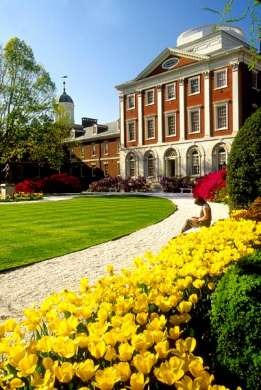 In 1751, the Pennsylvania Hospital at 8th and Spruce was 'way out in the country. Now it is in the center of a city, but the area still remains dominated by medical institutions.
In 1751, the Pennsylvania Hospital at 8th and Spruce was 'way out in the country. Now it is in the center of a city, but the area still remains dominated by medical institutions.
Larger Clubs
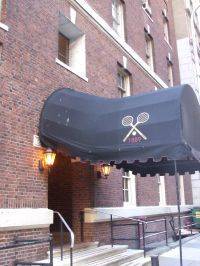
|
| The Racquet Club |
Philadelphia has dozens -- perhaps hundreds -- of clubs, societies, associations and organizations. Many owe their formation to the Sunday Blue Laws, which once made it illegal to obtain liquor on Sunday except on the premises of a private club. Some clubs were formed around the tradition that the stock exchanges (hence, the banks and brokerage houses) were open for business on Saturday mornings, leaving the financial community available for a long lunch, a drink afterward and a free afternoon in town. But primarily, Philadelphia already had a long tradition of fraternal and volunteer associations. Benjamin Franklin helped found a great many juntos, associations and volunteer groups for some civic purpose. Although he was not a Quaker, Franklin was in the Quaker tradition of forming voluntary committees and groups to get some particular job accomplished. In Quaker circles, aimless griping and complaining are not tolerated; if you have a "concern", you propose a solution which a committee can put into action, and you will probably be expected to be its chairman. The Quakers even had to devise a formula for "laying down" a committee when its purpose was completed, since, after a while, the original purpose of the club may disappear, but habit and good fellowship cause it to continue as a social club. A good example is a certain club which was originally founded for life-saving on the river, but now continues as an ice-skating club on the Main Line.
Anyway, clubs continue to be a center of Philadelphia life at the present time, often with founding traditions that are a little unclear to many of the members. It isn't as true as it was when the Sunday Blue laws were effective, or before the restaurant revolution overtook us, but to live in Philadelphia without being active in several clubs is to feel that nothing ever happens in this town, while your neighbors at the same time are so busy going to their clubs they never think to invite you. Or perhaps fear that since everyone goes to so many, you might feel pestered if they invited you to join.
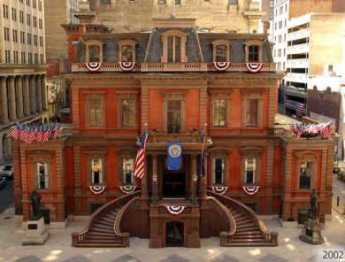
|
| Union League of Philadelphia |
There does exist a different sort of club entirely, however. The big-city in-town social club was started as a place to stay when transportation to the suburbs was tiresome, and large clusters of people had townhouses near the business district. A place to stay when your wife is visiting her relatives. A place for the local bachelors to congregate. A place where the CEOs can congregate fraternally, avoiding the isolation at work that comes from being the boss. A place where lawyers can have a long lunch while they wait for the phone to ring with the big case they can retire on. A place to loaf, play pool, get a haircut, get your shoes shined, play a game of squash. Or get a drink and a decent meal in comfortable surroundings. Jeff McFadden, the director of the Union League, describes these clubs as "day camps for adults".
Such clubs have had a hard time in recent decades. The ten-story Manufacturers and Bankers Club is now an office building, the prestigious Rittenhouse Club is shuttered, along with the Commerce Club, the Locust Club, and a dozen others. The most prestigious of all, the Philadelphia Club is in a decrepit neighborhood next to Broad Street, which it hopes will soon revive and make wrenching decisions unnecessary for the club. The interior is as close to an English city club as you could find, with immensely valuable paintings and furniture, creaking stairs and quaint bathrooms. You're not likely to find more than five members at lunch these days, but the food is excellent, the service superb, and the posted waiting list for membership quite comfortably long. The posted names tend to be a list of the cream of society, but most of them live thirty miles away. It's no longer possible to stay there overnight.
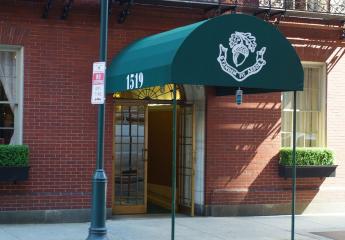
|
| The Acorn Club |
The Acorn Club is for women, quite frequently women whose husbands are members of the Philadelphia Club. If ever there were some political move to force the two clubs to abandon the men-only and women-only rules, a merger of the two would allow them to continue exactly as before as a single club with two facilities. The Acorn Club is just up Locust Street from the Academy of Music, and that is surely no accident. The place is immaculate, elegant, quiet, extremely well managed.
Around the corner on 16th Street is the architect Horace Trumbauer's turn-of-the-last-century Racquet Club. In some other city, it might be called the Athletic Club, which makes it more attractive to younger members than the other clubs, where billboards would be the extent of the exercise. Indoor swimming pools and gymnasia are extremely heavy and thus require expensive steel supports. This club not only has a pool, but it also has squash courts (both old-rule and new-rule), racquets courts (the thirty-foot walls are polished slate), and one of the five court tennis courts still in existence in the country. Court tennis is a strange game, of which it is said that "if you know the rules and own your own racquet, you are one of the top ten in the country". But the game originated in the Twelfth Century and was what people meant by "tennis" until 1878, when a game is known as "lawn tennis" was invented and took the world by storm. One of the other five court tennis courts is a few miles from the location of the hydrogen bomb factory on the Savannah River, eighty miles from Charleston. The DuPont Company put it there, and the location is no accident. > is having a hard time filling its space with members, but it would be so appallingly expensive to replace even a part of it, that superhuman efforts are justified to preserve it.
The Union League at Broad and Samson Streets, is the one outstanding exception to the decline of the center city men's club. When I joined it long ago, the strictest of rules prohibited women from any area except the women's dining room in the basement. I still remember the chairman of the admission committee, seated at the end of a long long table of gentlemen in the semi-darkness, intoning to me. "I'm going to ask you a question. And because I don't want any misunderstanding, I'm going to ask you twice. The question is, have you ever, even once, in any national, state or local election -- even once -- ever voted anything except straight Republican? Let me repeat, have you ever, even once. . . ?"
Well, the League lets in Democrats these days, and even quite a few women. But what has transformed the League from a declining relic into a thriving center of the Philadelphia social scene has been management. The League owns its own new parking garage across Samson Street from the side door, which is itself an innovation with a canopy. The dingy old members overnight rooms have been transformed into a four-star hotel, with concierge. The old steam rooms are now a modern exercise facility, and a dozen computers in the "business center" are always occupied. The menu has been upgraded, the service snappy instead of sleepy. The upstairs dining rooms usually have several hundred people for dinner when formerly they were deserted. Several times a year the League has an upscale dinner party for five hundred or so guests, that would be in a class with a reception for the King of England. Nobody any longer asks why they should be a member; they only ask whether they can afford it. Apparently, lots of people can, once they have a reason to.
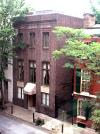
|
| Cosmopolitan Club of Philadelphia |
Over in a nearby short narrow street (we hesitate to call it an alley) near the Racquet Club, is the Cosmopolitan Club, for women only, thank you. It's small, probably would have trouble accommodating more than a hundred at a time, but the food and service are great. The real reason for the existence of this club is the wish of professional and working women to have a place to gather and support each other's morale, listen to uplifting speeches, help along with the younger ones and that sort of thing. In some ways, the Cosmopolitan Club is the most typical of all Philadelphia clubs.
Originally published: Thursday, August 18, 1994; most-recently modified: Wednesday, May 22, 2019
| Posted by: Mary Welsh | Sep 14, 2015 3:23 PM |